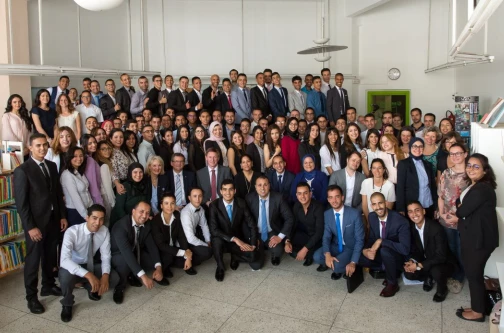
How times have changed. It’s true, demography is destiny. The German population is aging, and at 46 years the average age is second only to Japan. Its labor force is set to decline by 4 percent between 2010-2020 and the share of German firms reporting shortages of junior staff has more than doubled from 12 to 25 percent in the last decade. With a strong economy and low unemployment, it is estimated that firms will be short of 1.8m skilled workers by 2020, and 3.9m by 2040. On the other hand, in Morocco the labor force increased by 107,000 in 2013-14 whereas the economy only created 21,000 new jobs in that period. Youth comprise around 44 percent of the Moroccan working age population, but a bit over half of the working age population is out of the labor force. Among the employed, most find work in the informal sector.
In theory, this is a match made in heaven and should need no facilitation. However, supply and demand don’t always naturally meet. Moroccan workers seeking jobs overseas have no idea how to learn about job openings, reach potential employers, prepare for the interview, and if selected, prepare for successful labor market insertion and integration into a completely different economic and social environment from what they’ve known at home. Alongside, German employers starved of workers also face obstacles in launching a global search for workers while doing the day-to-day running of their small business. And even if they did identify a pool of foreign workers, not only are they overwhelmed by the notion of navigating the onerous bureaucratic immigration process of applying for work permits from their own governments, but are also unsure of how to actually screen and select workers from a foreign country.
It would be a pity to leave so much economic opportunity and wellbeing just remain locked up. Therefore, with the help of the Transition Fund, the World Bank has partnered with ANAPEC (Agence Nationale de Promotion de l’Emploi et de Competences) and GIZ (the German Federal Enterprise for International Cooperation) to help facilitate labor mobility in this bilateral corridor, and picked a sector which is important to both countries – Tourism. ANAPEC is the public intermediation agency in Morocco with a well-established international arm looking to diversify and scale up its placements into European labor markets, for whom it is key to develop the connections to these overseas employers and communities who can recruit and support the placement of Moroccan workers. Understanding what these employers look for in future workers is vital for ANAPEC to decipher and to convey to Moroccan youth who contact ANAPEC for help with their employment search. Maintaining a database of likely employers, the skills profiles being sought, the wages and work arrangements that can be reasonably expected, and understanding the German apprenticeship structure is vital for strengthening this international intermediation function. This is where the GIZ comes in with specialized knowledge on all these fronts, bringing German employers and their associations into the equation to recruit and prepare workers for their new life and integration into Germany, delivering pre departure training to these young workers, placing them into work and 3-year apprenticeship arrangements by matching their skills and personal preferences, and even delivering some information sharing modules to the families to this small batch of around 100 Moroccan youth who hold little more than a high school diploma.
If this small experiment succeeds in fostering these new partnerships and in making the processes somewhat less opaque on both sides, but above all, in building trust among the various institutions which matter from recruitment to integration, then it might just be able to pave the way for scale-ups and spinoffs in ways we can’t fully foresee yet but can surely imagine. By delivering a triple win for the young job seekers who have a chance to massively expand their incomes and skills, as well as for the source and host economies, this experiment could demonstrate that a more mobile workforce and more integrated international labor markets are not just imminent but also desirable when systems are set up to support it.
With fingers crossed then, could this be “….the beginning of a beautiful friendship” ?
More about the Project on Accessing Overseas Employment Opportunities for Moroccan Youth


Join the Conversation